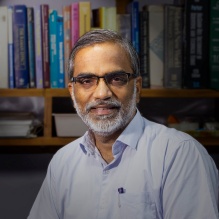Thalappil Pradeep
Institute Professor, Chair Professor
Indian Institute of Technology Madras, Deepak Parekh Institute
Department of Chemistry
Can Water Microdroplets Make Soil?
Abstract
Soil is formed from rocks, textbooks say. It is a slow process; one cm thick soil takes 200-400 years to form depending on conditions. Nanoscale particles are most essential constituents of soil which help in plant growth. We showed that common mineral particles break down spontaneously to form nanoparticles within milliseconds when encapsulated in charged water microdroplets. In our experiments, micrometer-sized minerals such as quartz and ruby were transformed into nanoparticles ranging from 5 to 10 nanometers. Computer simulations helped us to understand the process. This rapid weathering process could significantly contribute to soil formation, considering the widespread presence of charged aerosols in the atmosphere. The process could also be used to make soil industrially, to enhance agricultural productivity. The active surfaces of materials formed in microdroplets could lead to catalysis of relevance contributing to the biological evolution of the planet.
Bio
Thalappil Pradeep is one of the most prominent researchers of India in chemistry and materials. He is a fellow of all the four major science and engineering academies of India and six in the world.
Dr.Pradeep is an Institute Professor at the Indian Institute of Technology Madras (IITM), Chennai, India. He is the Deepak Parekh Institute Chair Professor and is also a Professor of Chemistry. He studied at the University of Calicut, Indian Institute of Science (IISc), UC Berkeley, and Purdue. His research interests are in molecular and nanoscale materials. He is an author of over 550 scientific papers in journals and is an inventor of over 100 issued patents. He is involved in the development of affordable technologies for drinking water purification and some of them have been commercialized. His pesticide removal technology has reached about 10 million people. His arsenic removal technology, approved for national implementation, is delivering arsenic free water to about 1.3 million people every day. Along with his associates, he has incubated seven companies and three of them have production units. He is the recipient of several awards including the Shanti Swaroop Bhatnagar Prize, BM Birla Science Prize, National Award for Nanoscience and Nanotechnology, India Nanotech Innovation Award, JC Bose National Fellowship and National Water Award. He has won The World Academy of Sciences (TWAS) prize in Chemistry for the year 2018. Nation conferred the civilian award, Padma Shri on him in 2020. He is also a recipient of the Nikkei Asia Prize, Prince Sultan Bin Abdulaziz International Prize for Water, VinFuture Prize and ENI award. Recently, he has won the International Excellence Award of Karlsruhe Institute of Technology, Germany and the Fellowship of Schroff Foundation. He is a Fellow of all the science and engineering academies of India, TWAS, American Association for the Advancement of Science, African Academy of Sciences, US National Academy of Engineering and Academia Europaea. He is the author of the introductory textbook, Nano: The Essentials (McGraw-Hill) and is an author of the monograph, Nanofluids (Wiley-Interscience) and an advanced textbook, A Textbook of Nanoscience and Nanotechnology (McGraw-Hill). He is on the editorial boards of journals such as ACS Nano, Chemistry of Materials, Analytical Chemistry, Chemical Communications, Nanoscale, JPC Letters, etc., and was an associate editor of ACS Sustainable Chemistry & Engineering for ten years. He is now an Associate Editor of ACS Sustainable Resource Management. He has authored popular science books in English and Malayalam and is a recipient of Kerala Sahitya Akademi Award for knowledge literature. He has received the Lifetime Achievement Research Award of IITM and Distinguished Alumnus Award of IISc. As part of philanthropy, he supports a school in his village where 500 students are enrolled.
Tuesday
October 1, 2024

Thalappil Pradeep
Institute Professor, Chair Professor
Department of Chemistry
Indian Institute of Technology Madras, Deepak Parekh Institute
- Time: 2:00 PM
- Location: 206 Furnas Hall